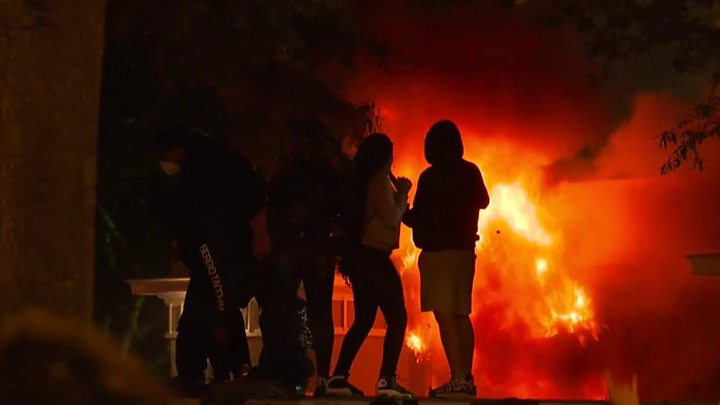Image copyright
Reuters
George Floyd, the African-American man whose death has sparked civil unrest, died from asphyxia (lack of oxygen), a private post-mortem examination found.
He died due to compression on his neck and back by Minneapolis police officers, medical examiners hired by the Floyd family said.
The findings differ from an official preliminary autopsy carried out by the county medical examiner.
It did not find evidence of “traumatic asphyxia or strangulation”.
“The cause of death in my opinion is asphyxia, due to compression to the neck – which can interfere with oxygen going to the brain – and compression to the back, which interferes with breathing,” said Michael Baden, a former New York City medical examiner who was one of two doctors hired by Mr Floyd’s family.
The pair found the death was a homicide, a statement from the Floyd family legal team said.

Media playback is unsupported on your device
A video showing a white police officer continuing to kneel on George Floyd’s neck even after he pleaded he could not breathe sparked outrage when it emerged a week ago.
It has led to six consecutive days of protest across the United States and a level of civil unrest not seen in decades.
Benjamin Crump, a lawyer for the Floyd family, told a press conference: “Beyond doubt he would be alive today if not for the pressure applied to his neck by officer Derek Chauvin and the strain on his body by two other officers.
He added: “The ambulance was his hearse.”
Mr Chauvin has been charged with third-degree murder and manslaughter but the Floyd family and their lawyers say the charge should be increased to first-degree murder.
More than 75 cities have seen protests, with streets only days ago deserted because of coronavirus full of demonstrators marching shoulder to shoulder.
The Floyd case has reignited deep-seated anger over police killings of black Americans and racism. It follows the high-profile cases of Michael Brown in Ferguson, Eric Garner in New York and others that have driven the Black Lives Matter movement.